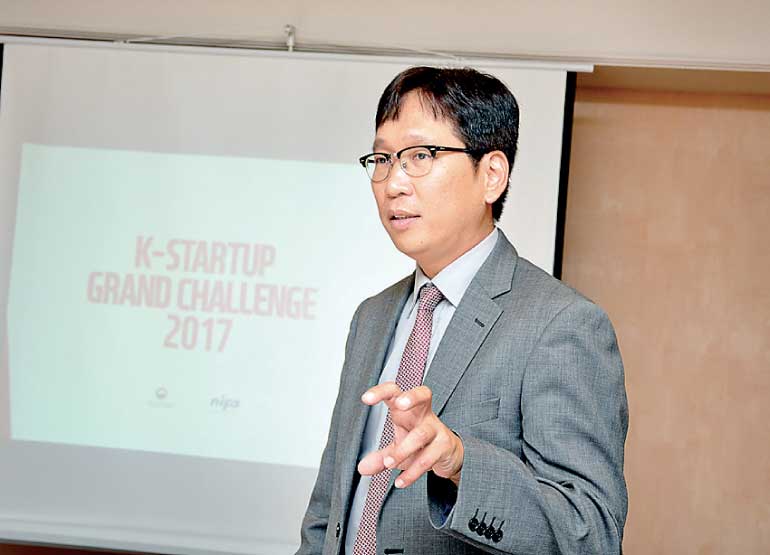Saturday Feb 21, 2026
Saturday Feb 21, 2026
Monday, 12 June 2017 00:01 - - {{hitsCtrl.values.hits}}
 India-Korea SW Cooperation Centre Executive Director Kyung Hwan Lee – Pic by Lasantha Kumara
India-Korea SW Cooperation Centre Executive Director Kyung Hwan Lee – Pic by Lasantha Kumara
In a bid to make South Korea Asia’s hub for startups, the Government is inviting startups from around the world for the second inning of its K-Startup Grand Challenge 2017 to gain a foothold in the buoyant Asian market.
The K-Startup Grand Challenge is organised by South Korea’s Ministry of Science, ICT and Future Planning (MSIP) and National IT
Industry Promotion Agency, in partnership with five Seoul-based accelerators.
The global startup event offers technology based startups that have a prototype or product service – catering to various industries, a chance to enter the Korean market and further expand its reach to global customers.
The South Korean Government has spent over $2 billion each year since 2013 and plans to invest nearly $3.7 billion in the startup industry in the next three years.
In this year’s program 50 top ranked startups will be selected and invited to stay in Korea for a four-month accelerator program in Pangyo Techno Valley, located south of Seoul where they will be able to interact with Korea’s leading technology companies which includes Samsung, LG, Hyundai, Kakao, KT, SK Group, and more. Startups will also be provided with mentors and office space.
The application window will be closed on 14 June and the selection panel will give priority to startups working on disruption in the AI, software, IoT, Cloud, FinTech, Big Data, information security, 5G, urban solutions, biotech, UHD, digital content, wearables, gaming, beauty and logistics.
Based on the application reviews, 50 startups will present in a demo day. The top 25 startups, selected by a panel of judges, will each receive additional financial grants for a six month settlement program. The top four startups will also receive
“The key focus of the K-Startup Grand Challenge this year is to promote collaboration and exchange of ideas between South Asia and Korea. We are eagerly looking forward to tap the enormous potential that lies in South Asian startup ecosystem and expecting to receive a large number of applications from this region,” India-Korea SW Cooperation Centre Executive Director Kyung Hwan Lee told journalists in Colombo recently.
He said a plethora of exciting opportunities await participants who will get an opportunity to showcase their entrepreneurial spirit.
“Several promising companies have taken their first steps into the Asian market poised to evolve into truly global players. All these continue to bolster Korea’s reputation as a leading ICT powerhouse in Asia,” he added.
The program has been applauded for its impartial section process, high levels of competence and passion displayed by the participants as well as their achievements.
K-Startup Grand Challenge is part of South Korea’s first program that directly supports foreign startups to set up business in Korea.
Last year over 2,400 teams from 124 countries competed to showcase their ideas and 13 local corporations and branches were established as a result of the event. In addition, 33 deals were signed with local/overseas companies along with 125 MoU/Partnership activities.
By Charumini de Silva
With Sri Lanka startup environment showcasing great promise a Korean expert recently insisted startup companies in the country use South Korea as a launch pad to enter growing Asian market.
“Sri Lanka can utilise South Korea as a test bed and simultaneously as a launch pad to enter into vibrant Asian market,” India-Korea SW Cooperation Centre Executive Director Kyung Hwan Lee told journalists in Colombo recently.
He pointed out that startup ecosystems seems to be one of the fast moving areas in Sri Lanka, where many youngsters want to set up new business models and do their own business activity based on a start up ecosystem.
Currently, Sri Lanka’s startup ecosystem is worth $32 million and has near to 300 active tech startups.
“In my opinion to make a successful startup business there are two factors — one is balancing ecosystem and the other is market,” he stressed.
He said simultaneous government supportive collaborations and initiatives, great signs of programs will take place in future for the betterment of sustainable economic growth in Sri Lanka and South Korea.